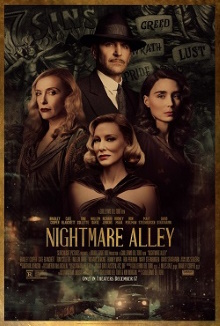This really counts as a remake since there was already a 1947 version adapted from the same book and they seem quite similar. You can tell from the subject matter how this is a good fit for Guillermo del Toro and it does a fantastic job of immersing the viewer in the world of carnivals. The film gets less interesting once the protagonist leaves the carnival with the main plot being rote and predictable. It’s lifted straight from the novel of course but it’s old fashioned and traditional that it would have been better to come up with a more modern twist.
Stan Carlisle leaves home after apparently setting it on fire and falls in with a travelling carnival. After doing some menial labor work for them, he gets close to Zeena and her husband Pete who perform a mentalist act. Stan learns the tricks of cold reading and surreptitiously communicating with a partner using hand signals and coded words. He is also attracted to another young performer Molly whose act consists of pretending to be electrocuted. Pete warns Stan never to take the act too far as to actually claim that he can speak to the dead. Soon afterwards Pete dies of alcohol poisoning and Stan takes Molly with him to strike out on their own. Years later, they establish a successful psychic elite for the wealthy in the city. One evening psychologist Lilith Ritter in the company of a judge Kimball tries to expose Stan’s act but fails. Kimball becomes convinced that Stan really can make contact with the afterlife and is willing to pay him a great deal of money to his dead son.
Before watching this I already knew all kinds of useless facts like what a geek is or how cold reading works, but it’s still a lot of fun to see how it plays out in a big budget film. We get bits and pieces of other acts too, like the snake man or the inside of a haunted house and that’s all great. We get a good sense of the kind of world the travelling carnivals operate in, how it absorbs all kinds of aimless drifters or people hiding from their pasts. It’s pretty hard to imagine people just disappearing into carnivals and become someone else these days. Once Stan leaves the carnival though, it becomes an ordinary thriller. The film wants to use Lilith Ritter as a femme fatale character but it’s not at all clear to me what her motivations are. Predictably Stan breaks his teacher’s rule of not going too far but why exactly is it wrong? The carnival folk aren’t exactly the most moral of people and breaking in some random alcoholic hobo as a geek seems far worse than fleecing some rich people.
Part of the problem is that this is an old story based on the moral values of the time and del Toro has decided to play it straight instead of giving the material a modern twist. Pretending to be able to speak to the dead in order to provide closure to the bereaved and make some money hardly seems like the worst sin. The film goes to some preposterous lengths to show why Stan’s actions are harmful but having a client commit suicide is so extreme as to be hardly generalizable. Del Toro also seems to shy away from dramatic confrontations with the resolution of Stan’s relationship with Molly being particularly empty and unsatisfying. Stan isn’t called to account by his fellow carnival workers who are his real peers. The revelations of his past feel limp and irrelevant, ultimately telling us nothing about his character. I think del Toro is simply an unimpressive director when it comes to human drama. He likes his monsters and weird eccentrics but this is really an old fashioned story about fallible humans and I don’t think he pulls it off well enough.
The carnival scenes are still great and I hope that revealing how cold reading works to the general public would be instructive to audiences and make a difference. But overall this is a middling film and it isn’t surprising that the reviews of it are lukewarm. It’s even a little too long for casual watching so I just can’t recommend it.
